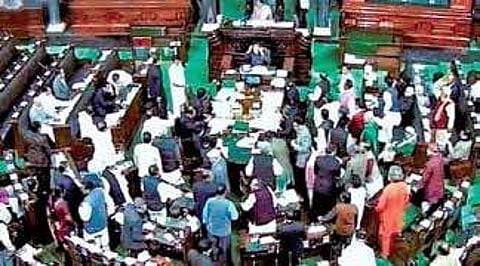

One of the outstanding features of the British Parliamentary system is the shadow cabinet. The opposition party forms its own cabinet that would parallel that of the ruling party. They work under the Leader of Opposition and will have expert party workers or neutral members assisting them. Each cabinet minister and his team are matched with a shadow minister in the Opposition. Just as there would be unelected expert advisors in the cabinet minister's team, the shadow minister also would have his own team. The shadow ministers neither have powers nor any extra payment, but they serve an important purpose. They get trained in governance while in the Opposition.
Each minister will have an in-depth knowledge of the portfolio she may be handling when her party gets power. The debates in the Parliament or Legislative Assemblies will become more informed instead of the cacophony Indian elected Houses are notorious for. This would make the life of the ruling party difficult in an informed and civilised way. The crux of democracy is that no government, whatever be the size of majority in the Parliament, can get away with autocratic and arbitrary decisions at the whims of its leader. Every act will have to be debated in the Parliament or Legislative Assembly. It is the debate that informs the public about the various aspects of any law that is being enacted.
In India, a cabinet minister is at an advantage when it comes to a parliamentary debate. He has a vast number of bureaucrats assisting him to prepare his side. Without a shadow minister handling a shadow portfolio with his own teams of experts, the Opposition is at a disadvantage. Its members would not know who would be tackling the cabinet minister concerned in the debate. The result is blind stalling of parliamentary process and vapid sloganeering, often culminating in a walk-out. Sometimes, the people are entertained with some hurling of projectiles like files, slippers and even chairs at each other peppered with swearing that would make a drunkard blush.
This helps a government to get away with anything through the ordinance route or by virtue of brute majority it may sometimes enjoy in the elected House. The Parliament sitting has drastically declined over the years. The state Assemblies are no better. One can observe a pattern in how the increasingly rare Parliament sessions are conducted. A random bill is introduced. The bureaucrat can afford to do a shoddy job as he knows nothing much is going to be debated anyway.
The opposition parties have neither time nor expertise to study the bill. No one is given responsibility and every opposition MP, in order to please his leader, would resort to screaming and thumping the desk without having a clue on what the bill is all about. This is matched by the ruling benches. The Speaker suspends the House for the day. One more session is wasted. Irrespective of the party in power, this has been the pattern for the last few decades. The agenda of the Opposition have been to blindly oppose anything and somehow stall the government from functioning.
India is a complex country to rule. One cannot take any action without hurting one group or another. There will never be a dearth of issues that could hijack a Parliament session. The precious Parliament time is wasted on issues that should be ideally solved at Panchayat level. Since nothing important happens in Parliament or Assemblies except mutual accusations and theatrics, the ministers and the Prime Minister can afford to skip the sessions and concentrate on their next election. This creates a cascading effect. The senior opposition leaders also would find it a waste of time to attend the Parliament and would concentrate more on countering the ruling party leaders by being in a constant campaigning mood. The floor of the Parliament is left to the minions whose only job is to create enough cacophony so that no one understands anything.
One of the major problems of Indian media is the lack of research and pressing deadlines. The media relies mainly on government handouts and thus becomes its mouthpiece. All media houses call a set of spokespersons for the television debate. These spokespersons imitate their colleagues in the elected houses—shout, scream, confuse and confound until the anchor concludes the debate in a way that would suit the agenda of whichever political party his media house supports. Irrespective of whether the debate is about nuclear technology or cotton farming, the same set of spokespersons would come to defend their party. Only expertise needed is a throat capable of making high decibel screams and a thick skin. If there is a shadow minister and an expert in each party, the media would know who to invite to present an opposing view.
A shadow cabinet would help each party to develop capable leaders who could conduct an informed debate. They would be able to corner the government with their expertise and not allow the ruling party to get away with empty slogans. It would take away the load off the Opposition Leader and the people would know who they would be getting as their ministers and how they are compared with the incumbent. This would keep the ministers and bureaucrats in their toes. Whenever the power changes hands, these shadow ministers already would have gained enough capability to run the ministry with an independent mind.
Another advantage of a shadow cabinet is that it would change the comparison of the PM with the Leader of the Opposition. It would change to comparison of the government’s cabinet versus the shadow. In the Westminster style of democracy that we follow, forming a shadow cabinet would only strengthen the democracy. This would put an end to the incongruous presidential style poll campaign that relies on the personality cult or the family lineage.
Anand Neelakantan
mail@asura.co.in
Author, columnist, speaker